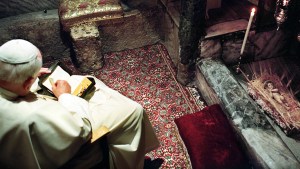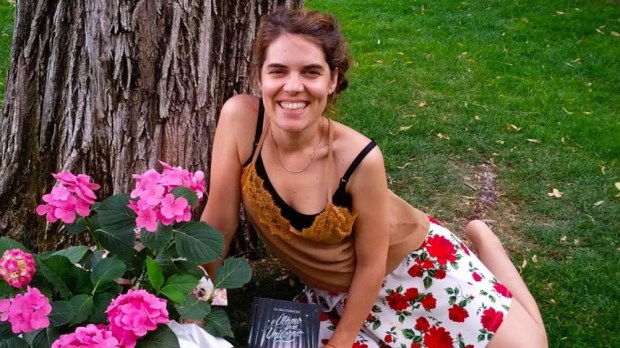In a society in which abortion is considered a woman’s right, Leire Navaridas, a Spaniard, wants to shed light on her experience by giving talks to debunk the “goodness” of abortion.
“I am a mother of three children, although only one of them is alive,” she says. She’s managed to forgive herself after several years of suffering and lack of love, and she’s managed to establish a spiritual relationship with the children she never knew.
She doesn’t try to justify herself when she talks about her past life, when she says she lacked values and made poor decisions. But she does highlight the fact that nobody tried to stop her from going to the clinic to have an abortion.
In Spain, the current euphemism for abortion is “IVE,” for Voluntary Interruption of Pregnancy (“Interrupción Voluntaria del Embarazo” in Spanish). Leire says it should stand for Violent Intervention in Pregnancy, because the “IVE” includes the first big lie about abortion: Something that is “interrupted” can be taken up again, but if you “interrupt” your pregnancy, there’s nothing you can do to bring that baby back.
She also points out that often it’s not totally “voluntary,” because women who have an abortion are often under pressure due to their circumstances. Rarely are they fully informed about the full truth of the nature and consequences of an abortion.
According to an article on Redmadre, Leire became pregnant for the first time at the age of 26. She didn’t feel ready for a baby; despite being married, she felt “alone and overwhelmed.” Without asking her husband what he thought, she scheduled an appointment with a gynecologist who performs abortions.
After signing a document stating that continuing with the pregnancy would cause her psychological problems, Leire’s abortion was performed. “We left the clinic, went home, and never spoke of it again,” she said.
Leire tells how, after the abortion, she was in a sad and dark state, which manifested itself psychosomatically as dizziness. She then decided to seek professional help. The therapist was the first to tell her the truth about her life: “You are alone.”
When such a lack of trust, love, and respect for life exists in your immediate environment, your own attitude becomes destructive, towards yourself and towards everything around you.
Her pain and suffering were being camouflaged in the form of other problems, such as her bouts of dizziness, which ultimately stemmed from the abortion itself.
A second unexpected pregnancy
She got pregnant again shortly after starting therapy. Although she didn’t want to have an abortion again, fearing it might damage her reproductive system, she still considered her situation inconvenient for a pregnancy. But her therapist said something to her that touched her deep inside: “Leire, stop destroying and start building.”
She says she left therapy renewed, looking forward to being a mother. She started to connect with the baby she was expecting, recognizing it as her child, and feeling ready to do whatever it would take to raise that child. She started to feel excitement and hope.
Then she lost her child in the third month of pregnancy, due to complications resulting from her previous abortion. She was emotionally unable to handle the situation: “I didn’t mourn that loss either. I lived it coldly,” she says.
Her environment was the same as before; she didn’t feel any support. Leire says she lacked the most basic support that is necessary for a pregnant woman, and even more so when she was in a vulnerable situation.
It was only years later and after her divorce, Redmadre reports, that with the help of her therapist she was able to “open the floodgates that held back all the sorrow from my abortion and miscarriage … I couldn’t stop crying. The guilt of the first and the sorrow of the second threw me off an emotional precipice.” Fortunately, she found people who supported her and helped her through this phase.
Now, she speaks proudly of her collaboration with the REDMADRE (“Mothers Network”) Foundation and its motto, “You will never be alone.” This foundation gives unconditional, real, and necessary support to pregnant women who find themselves in such a complicated situation that they have come to consider abortion, says Leire.
Love cures everything
Leire describes how she grew up in an environment where she learned total distrust towards other people, which ultimately was a lack of love.
“Love heals everything, and even if a wound remains in the heart, you can go forward and live in peace,” she says now.
She has remarried and the love of her current husband has made her realize that she was the victim of a social system that attacks life and motherhood. She’s not wrong; in 2018, the Spanish government spent more than 30 million euros on financing abortion, compared to 3.6 million euros on helping pregnant women.
She declares herself a feminist, believes in social equality between men and women and in equal opportunities for both sexes, and fights for these goals. But she is totally opposed to the widespread feminist discourse that defends abortion, that states that after conception there’s only a cluster of cells and not a life, that gives women the power to decide which life is worth living or not, and that falsely promises that after an abortion there are no after-effects.
“I cannot be fooled. I know what it’s like to go through an abortion, as well as to lose a wanted baby and to see a child born,” she says.
Leire explains that women are empowered by motherhood; according to her, a woman with a child in her arms is capable of anything.
But to do this, we must get rid of the false myths about motherhood that are propagated today. “’Children only belong to the mother. They bring problems, and they’re too expensive…’ These are subliminal messages that transmit the idea that children destroy your life,” she explains.
This way of thinking makes us selfish, for it makes parents’ self-giving love to their children seem like an obstacle to personal fulfillment. This attitude takes us away from our most basic nature, and the call most people feel to parenthood and family life.
Today Leire lives happily with her family. She also continues to love her unborn children, and remembers every year how old they would be. After hating herself for a long time, she’s managed to forgive herself, and she tries to help other women who’ve gone through the same experience to forgive themselves and heal as well.

Read more:
If you’ve had an abortion, a message to you from John Paul II

Read more:
How a woman’s will saved a baby from abortion

